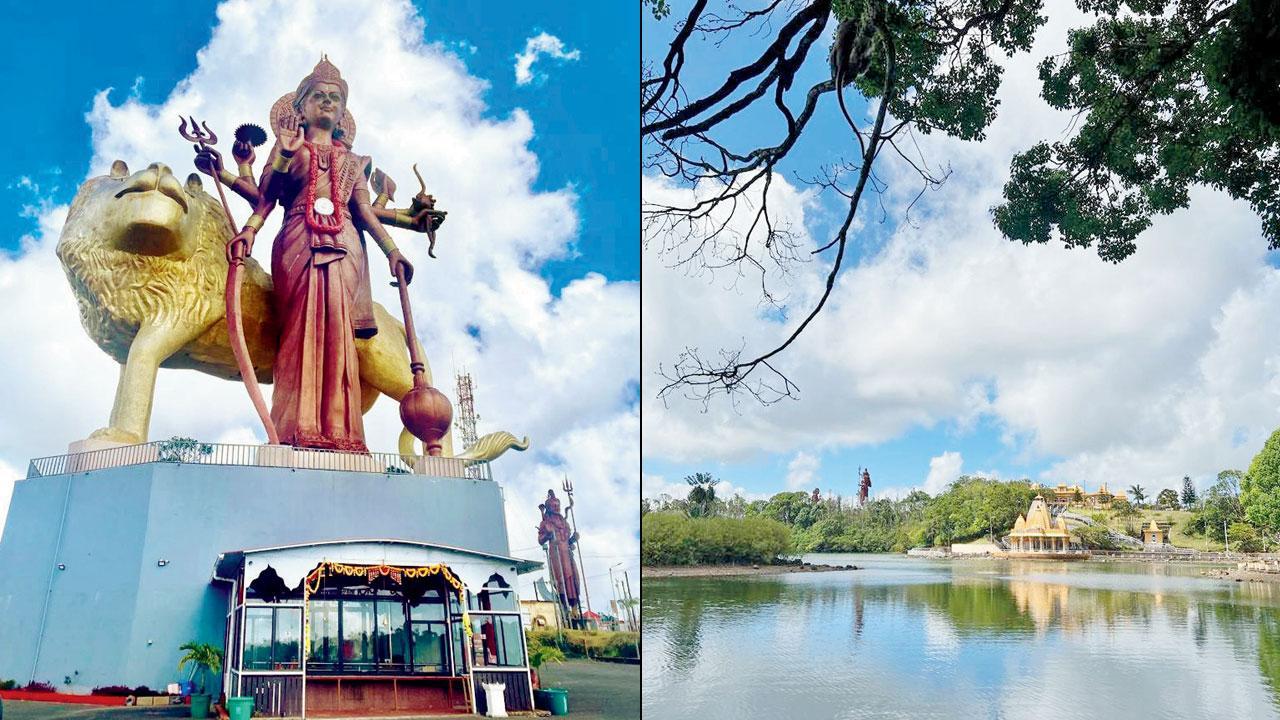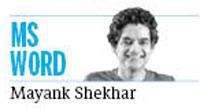Briefly surveying God’s own, temple city-state, and a miracle, Bihari-African economy, Mauritius

Statue of Goddess Durga, with Lord Shiva near Ganga Talao (right) at Savanne district, Mauritius. Pics/Mayank Shekhar
 Is there something inherent to the language that the songs in it, no matter who writes them, can’t resist a dollop/dose of random obscenity,” I wonder, as my Mauritian friend Shivaranjali says she doesn’t listen to local Bhojpuri numbers. She finds them “vulgar”. This is said for Bhojpuri songs, seven samundar apart, in Bihar too, as we speak.
Is there something inherent to the language that the songs in it, no matter who writes them, can’t resist a dollop/dose of random obscenity,” I wonder, as my Mauritian friend Shivaranjali says she doesn’t listen to local Bhojpuri numbers. She finds them “vulgar”. This is said for Bhojpuri songs, seven samundar apart, in Bihar too, as we speak.
ADVERTISEMENT
Not true though for the Mauritian-Bhojpuri star-singer, the late Sona Noyan, I’ve been tripping on lately—especially his 2010 Sankranti show (on YouTube). His tracks seem to be about chilling, eating—‘kalundi’ (mushroom) over dal-puri—even chikungunya (mosquitoes), for god’s sake.
Unlike his star-rival, Basant Soopaul—who turns romantic Bollywood tracks into bhajans, but also specialises in suhaag-raat numbers. Naughty teases, even hurling cusses/abuses, are part of Bhojpuri folk-song tradition—namely ‘gamat’ entertainment, performed during weddings/family functions.
I recognise Basant’s surname Soopaul, from a small district in Bihar. My friend Shivaranjali’s last name Virasami sounds decidedly South Indian. Hence the parts of India, I suppose, that their ancestors must have reached Port Louis’s Apravasi Ghat from—in the 19th Century, to work on Mauritian farmlands for free!
Also Read: 2023 reasons to hope again
Shivaranjali, like Mohan, Sanjay, Anil, Sakshi and others I bump into, comprise their nation’s 50 per cent, evidently-devout Hindu population—making Mauritius a uniquely Hindu-majority state, full of deities’ statues and temples, in Africa. With, of course, a Constitution that explicitly debars any discrimination, basis religion; and indeed, grants citizens the right to practice, preach, convert, to whichever faith they like.
Muslims, mainly Sunnis, make up about 17 per cent. As with Hindus, their ancestors, about five to six generations ago, came from India. There was obviously no Pakistan then. I try to gauge if there’s any Hindu-Muslim animosity in Mauritius—of the sort embedded in India’s modern history, peaking with Partition?
None—whatsoever. For some reason, both Hindus, Muslims take maximum pride in telling me (an Indian), about how they co-habit like good neighbours: “We got no God problem!”
If anything, both seem unhappy with “appeasement politics”—directed at the Creoles! That’s Christians of African origin—relatively poor, therefore beneficiaries of state-welfare schemes.
Frankly, if Mauritians did nothing for a living, they’d be fine, forever—health and education is free; travel is taken care of, for the really old and young; unemployment benefits, including state housing is available (on eligibility) too.
This, when the Mauritian, with an average income of over US$25,000, per year, I’m told, pays around 15 per cent tax! In a tiny island, of 1.3 million, that has to import everything to survive… What explains?
Besides a sugar-bowl, and an unbelievably pristine, tourist-paradise (Goa, without a population), that Mauritius is—the secret to its “miracle economy” is, as locals hush: “Evasion fiscale paradis”. Pardon the French: I hear evasion, fiscal, paradise [tax haven]!
While everyone’s probably a chiller here, in casual chats, brown Hindu, Muslim folk lament to me about how the black community, particularly, must work harder, rather than laze, or indulge in petty crimes. I sense a bias. Reminds me of the Arabic proverb: “Me and my brother, against my cousin. Me and my cousin, against the stranger!”
The chronology of their migration is simple. The French brought in Africans (from Madagascar and other parts), as slaves, early 1700s. The British took over, early 1800s. They imported/enforced indentured labour, from their colony, i.e. India.
Lording over browns and blacks are Mauritius’s small, white population still—of European descent, mostly Franco-Mauritians, who continue to own massive sugarcane farms, bungalows, and big money. Mauritius gained independence from the colonial Empire in 1968.
So, then? Well, unlike, say, Indian Independence, which overthrew the British, bringing politics, economy under control of locals—the fact is, until the Europeans, Mauritius had no locals!
The majority then, whether of Indian or African origin, are Mauritians, because of—and technically as much as—the Europeans too. There is no legal case for them to throw out the Franco-Mauritian landlords either.
What Brexit did for Mauritius is, of course, grant their citizens the right to directly elect their own head of state, who’s their Prime Minister. In 1992, it became a republic. Meaning, the Queen of England, as the figure-head, got replaced by the President, designed to be a ‘rubber-stamp’, like India’s.
As per The Economist’s Democracy Index, Mauritius is the only African country that’s a “full democracy”. The other three democracy categories are “flawed”, “hybrid”, and “an authoritarian regime”. There are only two other nations in the world, with Hindu majorities—India is deemed a “flawed democracy”, and Nepal, “hybrid”.
Equally evident is that people in Mauritius vote along religious lines. Practically all Mauritian PMs have been Hindus—although, essentially, between the Jugnauth and Ramgoolam households. Current PM, Pravind Jugnauth, is son of Anerood, the PM before him. Navin Ramgoolam, before that, was son of Seewoosagur, Mauritius’s first PM, after independence.
Pravind is in power, because his father Anerood passed on his chair to him, mid-way into his 2014-19 term. Pravind got re-elected in 2019. A better way to tell a “full democracy” is how easily people can bitch about their leader, without any fear.
Besides messing with the city-state’s precious night-life, Pravind, I’m often told, “can’t stand dissent, he’s locked up his critics; delved in ‘state capture’, subverting independent institutions, like the Election Commission, judiciary....”
Hmmm.
Mayank Shekhar attempts to make sense of mass culture. He tweets @mayankw14
Send your feedback to mailbag@mid-day.com
The views expressed in this column are the individual’s and don’t represent those of the paper.
 Subscribe today by clicking the link and stay updated with the latest news!" Click here!
Subscribe today by clicking the link and stay updated with the latest news!" Click here!








